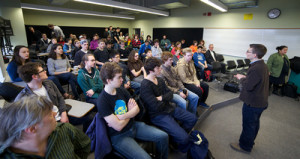There is a basic pattern to how anyone learns anything. It goes like this – you:
1) learn something new and understand it but are not yet able to do it consistently
2) repeat the new info until you are consciously competent at it, meaning you can do it but need to think about it while doing it
3) repeat the new info enough that it gets imbedded into your sub-conscious and you can do it but still need to think about doing it occasionally and
4) repeat the new info until it is imbedded deeply into your sub-conscious and is repeatable without thinking about it.
We tend to choose teachers to help us along this learning path who we deem able to instruct us wisely on the path of least resistance and the most enjoyable.
In music instruction, most students and educational institutions believe that if you have a successful career as a musician, that you must be able to teach how to do that to other people. The prestigious name of the performing group you belong to is reason to believe that you will be as excellent a teacher and caring person for the music students aspiring to do what you did and do – play music at a high professional level with consistency and command of your instrument, adding in your expert musicianship along the way.
This is not true.
First: Not all professional musicians have studied how to teach effectively. Many do not really like teaching when involved in heavy performance schedules.
Second: Not all professional musicians have a desire to teach but will take a position in a higher level of education because it looks good on their resume and it adds to their pay scale.
Third: Few institutions ask, when hiring teachers for its music program, what training pros have in music education. Nor are the pros asked about their teaching styles, use of materials or love of helping music students.
Fourth: The music institutions themselves are usually fighting for funding and are consumed by getting the highest number of students to pay tuition fees. Finding the front door of the music building is requirement enough to get in to the program.
All this is to say, that if you are thinking about studying music in an institution that purports to have an esteemed faculty of successful performing musicians that you not jump to the conclusion that those same performing musicians are equally successful as teachers. To set your clear goals, ask lots of questions: Whose students are winning positions in orchestras you want to play in? What method does the teacher use to help learning and successful performances? Speak to fellow students about the teacher’s educational style and approach to practising/performing and auditioning. Take in 10 questions for your lesson and allow your teacher to respond. Once you have tried out their suggestions, really pay attention to what works for you and what does not. Ask more questions!
Know that you are ultimately the best teacher for you and repetition is really the best method to become increasingly confident. You want a teacher who can help guide you to the easiest form of practising for results. The teacher can sometimes not be the most successful performer themselves but have achieved excellence in communicating ideas, inspiring your practice and performances, the use a variety of formulas to ease your journey and cheer you on to your success at what you want musically, technically and in consistency. Are they going to be an ally once you graduate in terms of further advice and guidance? This is one of your most important relationships in your chosen field. You may have any number of teachers and mentors for years to come. Choose wisely for your own needs and realize that your hard earned tuition fees are paying your teacher but you need to be very clear about what you want from them in terms of support, covering technical and musical material and clear goals about your improvement. You are the customer in an institution and you deserve the best possible instruction but you need to do your homework on how to get that quality of teaching. And then, stay self-aware of your limitations, your needs and your strengths. Find the teacher who also sees those characteristics. This may be a combination of people including many who do not even play your instrument. Be creative and choose a teacher or teachers with your own goals clearly communicated to all of these people. Teachers shine the guiding light for your speedy progress and satisfaction. It is your clearly thought out goals that will help them to help you.
